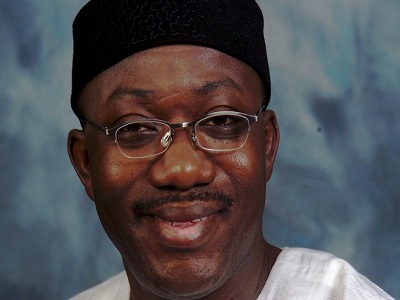General News
Ekiti Distributes 48,000 Laptops to Teachers, Students

Ekiti State government has distributed 48,000 computers to teachers and students for the purpose of enhancing teaching and learning in the State, according to Dr. Kayode Fayemi, the governor.
Ekiti State in March, 2012, made history in its education sector with the commencement of the distribution, then 11,000 units of laptop computers to students and teachers of public secondary schools in the state, under the first phase.
However, Dr. Fayemi speaking through Mr. Kayode Jegede, his special assistant on Infrastructural Development and Special Duties, during the maiden Telecom Stakeholders Summit organized by the Nigeria Communications Commission (NCC) in Lagos, recently, said that out of the number, 30,000 students benefited from the gestures, while the remaining 18,000 where for teachers.
Fayemi said that the move is geared towards making Ekiti the ICT capital of Nigeria and in preparation for Ekiti Digital Platform, biometric payroll, e-payment IGR system and laying of fibre-optic cables in Ado-Ekiti, the state capital.
He said, “The present government has gone this far to ensure that everything is done to make us stand shoulders higher than other states by recreating our feat in the areas of academic excellence that our land was in the time past identified with”.
He added that the project has become quite imperative for those involved in the teaching and learning process to be computer-literate in line with global standard of knowledge acquisition.
Fayemi added that given the huge investment on the e-learning project for all secondary school students’ initiative, “some might even deem it as a waste”. He said the State Government can not be distracted in the pursuit of the digitalized city scheme.
He disclosed that Ekiti and NCC have reached understanding on the construction of emergency call centre in the State, “thus, we are eager to see affordable broadband that will drive our numerous ICT initiatives.
“ICT has helped us in fighting insecurity. We discovered that with effective communication the Police can perform better. This is evident in our Rapid Response Squad (RRS) that has galvanized the potentials in ICT to combat crime,” the Governor added.
General News
Cellulant Taps Freddie Oduro to Lead Enterprise Payments Expansion in Ghana

Cellulant, a leading Pan-African payments company enabling seamless digital transactions across Africa, has appointed Mr. Freddie Oduro as its new Country Manager for Ghana.

Mr. Freddie Oduro, New Country Manager for Ghana.
Freddie’s appointment is a key step in Cellulant’s broader strategy to deepen its presence in priority markets by accelerating the acquisition of in-country enterprise businesses and strengthening its position as the payments partner of choice in Africa.
Freddie brings over a decade of commercial and strategic leadership experience in the telecommunications and financial services sectors, with expertise in sales, business operations, and market expansion.
In his new role, he will drive merchant acquisition, strengthening partnerships, oversee collections and payout operations, while ensuring strong internal controls and regulatory compliance.
He joins Cellulant from Payaza and previously served as Sales Director at Cellulant, where he helped significantly expand the company’s footprint in Ghana.
Cellulant has been powering payments in Ghana for leading brands in sectors like e-commerce, utilities, oil and gas and retail, helping them offer their customers a wide range of secure digital payment options.
“We are happy to welcome Freddie back to the Cellulant family,” says Richard Gesimba, Chief Revenue Officer at Cellulant. “Ghana remains a critical market for us, with immense potential driven by rising digital payments adoption.
“As we sharpen our focus on in-country enterprise customers, Freddie’s leadership and industry insight make him the ideal person to steer our Ghana operations.”
The appointment comes at a transformative time for the company. Following a strategic shift between late 2023 and early 2024, focused on streamlining operations, doubling down on enterprise payments, and strengthening customer intimacy, Cellulant achieved profitability in 2024 and continues to build on this momentum.
The company now processes close to 4.5 million transactions daily for businesses across Africa, reinforcing its position as a fintech leader.
“I am honoured to return to Cellulant and lead the Ghana team at such a defining moment,” says Freddie, Country Manager for Cellulant Ghana. “Ghana presents a tremendous opportunity.
“We will ramp up our efforts to sign on more local merchants, strengthen our compliance and control frameworks, and introduce innovative solutions like Tingg Edupay, our automated school fee management solution that eliminates reconciliation delays by validating payments in real time and instantly updating student accounts.
“We will build on Cellulant’s strong foundation to deliver real value, reliability, and economic impact.”
Ghana’s digital payments sector continues to grow steadily, supported by increased mobile money usage and a progressive regulatory environment. Between January and October 2025, the value of mobile money transactions hit about GH¢ 3.6 trillion, up sharply from GH¢ 2.37 trillion in the same period of 2024.
Registered mobile money accounts now exceed 79 million, demonstrating strong consumer and business confidence in digital financial services and in turn creating many opportunities for payment innovation.
This leadership appointment underscores Cellulant’s commitment to building a resilient, high-performance organisation geared towards playing a pivotal role in the next era of Africa’s digital economy.
Looking ahead to 2026, Cellulant plans to further enhance the user experience on its payment platform, Tingg, and expand its footprint across Ghana.
General News
Top Nigerian Startups Secure Funding Boost @ iHatch Demo Day Awards

Nigeria’s startup ecosystem received a fresh injection of momentum as top emerging ventures secured funding and investor attention at the iHatch National Demo Day, where Interface Africa clinched the highest prize of $15,000.

The 4th cohort of the NITDA–JICA-backed accelerator brought together founders, policymakers, and venture stakeholders in Abuja, showcasing innovations ranging from clean-energy financing and digital food marketplaces to next-gen fintech tools.
The startups went rounds of running through state-level selections and regional competition. iHatch was established in 2021 as a strategic partnership to create an enabling environment for young Nigerians to develop and scale their innovative solutions.
The iHatch National Demo Day (4th Cohort), is an initiative by NITDA and JICA which provides a clear pathway for homegrown talent to contribute significantly to economic diversification and digital transformation.
After rigorous selection processes, the top founders converged to pitch their innovations, recognised the standout performers, which are:
Interface Africa with $15,000, the firm is driving Nigeria’s clean energy transition by enabling structured and affordable solar financing.
Ahioma with $12,000, the firm enhances food accessibility with a digital marketplace connecting consumers directly to trusted vendors.
Linia Finance with $10,000, the firm is helping Nigerians take control of their finances with tools for budgeting, tracking, and smart money planning.
Chapta got a laptop reward. They delivering an offline-capable school application ensuring consistent, accessible learning for students everywhere.
Softdrop also got a laptop reward, they solve logistics challenges through a modern delivery platform designed for speed, convenience, and efficiency.
General News
Fidelity Bank to Host Virtual Masterclass on New Tax Law

Fidelity Bank Plc, a leading financial institution, will host a free virtual training on the Nigeria Tax Act 2025 (NTA) as part of its commitment to helping small businesses prepare for the upcoming legislation.

Fidelity Bank
The masterclass is scheduled for 10:00 AM (Nigerian time) on Friday, 12 December 2025. It will provide participants with clear insights into changes in the tax framework, the impact on income and business operations, and practical steps to avoid penalties in 2026.
Attendees will also learn strategies to stay ahead in an evolving regulatory environment.
The Nigerian government enacted major tax reforms on 26 June 2025 when President Bola Ahmed Tinubu signed four tax bills into law.
These Acts will take effect on 1 January 2026 and represent a significant overhaul of the country’s tax system.
The reforms aim to modernize and harmonize Nigeria’s tax framework, improve revenue generation, broaden the tax base, and create clearer rules for individuals, businesses, and government agencies.
“Our decision to host this masterclass reflects our commitment to empowering businesses with the right information ahead of the commencement of the new tax regime.
“Information is money and a well-informed business owner is already steps ahead in the race to success.
“This is why we are bringing experts to provide accurate details and demystify the tax act,” said Osita Ede, Divisional Head, Product Development, Fidelity Bank Plc.
Interested participants can register via https://bit.ly/2026TaxLawMasterclass .

 Telecom3 days ago
Telecom3 days agoMinister Claims Bandits Exploit Poor Network, Bounce Calls Off Multiple Towers

 E-Financial3 days ago
E-Financial3 days agoFIRS says MOU with DGFIP Won’t Compromise Nigeria Tax Data Sovereignty

 General News3 days ago
General News3 days agoTop Nigerian Startups Secure Funding Boost @ iHatch Demo Day Awards

 Broadcasting3 days ago
Broadcasting3 days agoNCC Blocks Piracy Sites as Nollywood Faces Rising Digital Theft

 Telecom3 days ago
Telecom3 days agoCBN, NCC to Launch Short Code for Swift Consumer Complaint Resolution

 Telecom3 days ago
Telecom3 days agoGoogle.org Backs CyberSafe’s Resilio Africa to Shield 2m People from Cyber Threats

 Broadcasting3 days ago
Broadcasting3 days agoFour Must-Watch African Films Debut Free on Glo TV

 Telecom3 days ago
Telecom3 days agoNASENI Launches FutureMakers to Inspire Innovation in Young Nigerians























